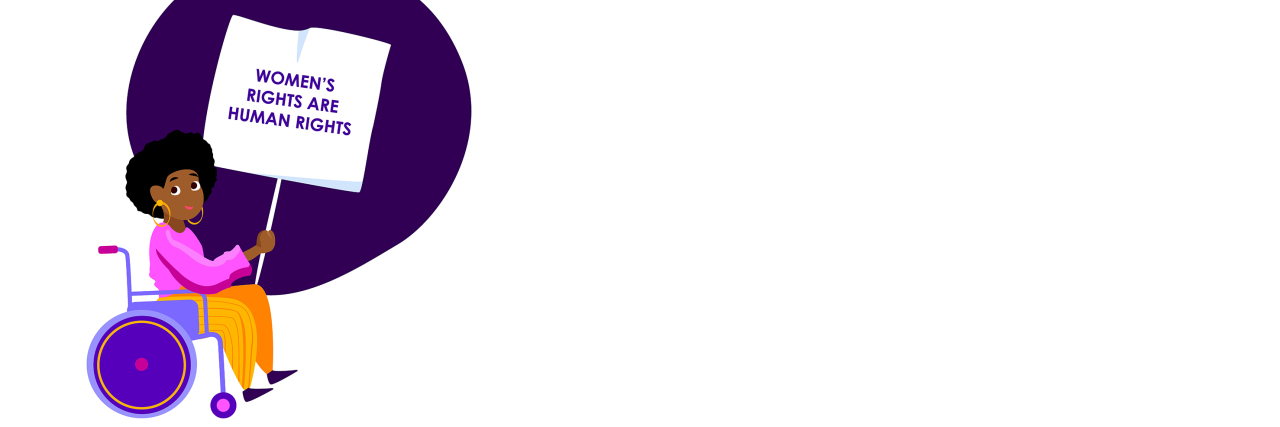Why Many Women With Disabilities Can't Access Sexual and Reproductive Health Care
For many women, getting a pap smear or family planning advice simply requires scheduling a doctor’s appointment. Unfortunately, women with disabilities must fight for our right to gain access to reproductive health services.
The National Council on Disability has found that women with disabilities are less likely to receive annual pap tests and mammograms compared to women without disabilities, regardless of age. We are also more likely than women without disabilities to delay getting the medical care we need, and some of us have reported avoiding reproductive health appointments altogether because services are extremely difficult to obtain. Women with disabilities have trouble acquiring such appointments for multiple reasons, including the inaccessibility of medical offices, a lack of knowledge about disabilities on the part of healthcare professionals, myths regarding sexuality and people with disabilities, and the socioeconomic status of many people with disabilities.
I have encountered some of these barriers myself. I first went to a gynecologist at 25 years old, after a nurse who worked for me at the time urged me that it was important to go to such a doctor for cancer-screening purposes, despite not yet being sexually active. The appointment was not only uncomfortable as many of my friends warned me it would be, but also painful and embarrassing because not only did the doctor make a number of inappropriate sexual jokes throughout the exam, he was not nearly as careful as he should have been, which caused me to bleed significantly.
My husband and I have been together for a few years now and are considering having a family someday. One of the reasons we have not yet is because we both have questions and concerns about how cerebral palsy could impact a pregnancy and vice versa. Sadly, yet not surprisingly, the women’s health doctors I have seen have not been able to adequately address our concerns.
I scheduled an appointment with a health clinic specifically for women with disabilities affiliated with a university in hopes that the staff there would be able to offer us guidance. After traveling six hours, I got there to find the clinic under construction with just one exam room in use. The doctors were behind as a result. Unfortunately, we did not get a chance to eat much that day due to making the trip so, after waiting for over two hours and being laughed at by a very inconsiderate receptionist, I started feeling sick and chose to leave. As you can imagine, the whole experience was frustrating and very disheartening.
I am not the first woman with a disability to encounter problems like this when addressing sexual and reproductive health and rights (SRHR) and sadly, I won’t be the last. My suggestion to other women navigating these types of barriers to reproductive health care is to take a trusted family member or friend with you to assist you in conquering potential accessibility issues, such as getting up onto an examination table, and to otherwise support you throughout the appointment.
Secondly, educate yourself about sexual and reproductive health and rights so you can educate others, including your doctors if needed. There are many myths about people with disabilities, including the belief that we are not sexual beings, that have led many doctors to think they do not need to be familiar with the needs of people with disabilities. We have a responsibility to dispel this myth as well as other myths out there regarding our sexuality to help healthcare professionals see that our sexual and reproductive health and rights are just as important as that of any other population.
Furthermore, I believe we have a responsibility as women with disabilities to share our knowledge and support one another. For example, I did not know you can ask gynecologists to heat examination tools until I joined an online support group for women with cerebral palsy.
Insurance is another barrier that often prevents many people with disabilities from accessing needed healthcare. Many medical professionals, particularly specialists, are less likely to accept Medicaid because claims are paid at a lower rate than by other insurance plans. As time-consuming and frustrating as it can be, I recommend contacting your state representatives as well as federal legislators to express your frustration regarding this issue and emphasize the importance of access to quality healthcare. You can easily find your congressional district by entering your zip code into the online representative search. Voting for representatives that care about women’s health and the health of those with disabilities is one way to help ensure legislators will listen to such concerns. You can also sign petitions like this one, which is fighting for better access to cervical cancer screenings for women in the U.K., or you can even start your own petition.
Finally, I’d like to remind everyone that there are some people with disabilities out there who do not have the capability to fight, or were never given the chance to learn about their sexuality and how to self-advocate. Regardless of how we choose to advocate for our sexual and reproductive health and rights, we must do so not only for ourselves, but also for our community as a whole. We cannot let an inaccessible healthcare system silence us and continue to put us at risk. Stand up for your rights and share any difficulties you’ve had. The sooner we come together, the better chance we have of getting the sexual and reproductive healthcare we really need.
Getty image by Alina Kvaratskhelia.

